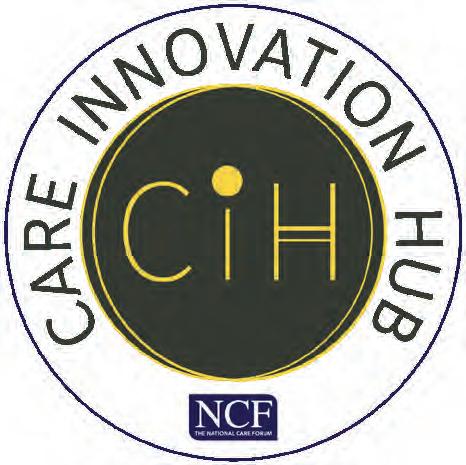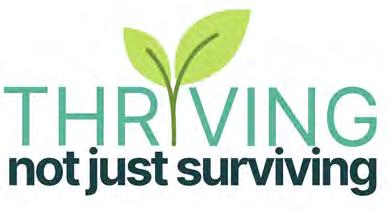
14 minute read
Want to h elp i mp rove th e qu al ity of li fe of thos e receivi ng care in the U K?
The Care Innovation Hub hosts an annual incubator programme that brings together innovators and problem solvers with care providers and people with lived experience to create solutions to key challenges

Advertisement
The Care Innovation Challenge is a hackathon-style creative weekend of idea generation and prototype trialling in July 2023.
With cash prizes for the top spots, expert mentoring and guaranteed media coverage this is an opportunity not to be missed.
Who can apply?
• University students
• Entrepreneurs
• Working professionals
•
• People with lived experience of care and support
You can apply as a team or as an individual. Teams must be 2-3 people. Visit www.careinnovationhub.org.uk
Realising The Potential Of An International Workforce
The Government has urged providers to explore international recruitment and make it part of a wider recruitment strategy.
In this article, Suleman Sacranie, Founder of Care Hires, a temporary staffing management system, outlines the process and offers his advice to reassure providers.


On a typical day in 2022, there were 165,000 job vacancies in the care sector. In just eight years, there is predicted to be an additional 627,000 staff needed to work in the sector.
Looking at these figures, it's obvious that we need solutions to the challenge of recruiting for care roles and filling the skills gap. There has been movement from the Government to support domestic recruitment and there are talks of funding and qualification reforms. However, our focus must be on looking for solutions at home and abroad to hire people with the right skills and values to pursue a career in the care sector.
Overseas recruitment can be a bone of contention; for some, it feels complicated and mired in a mountain of administrative red tape and for others it feels like a risk to their existing staff. However, there are ways to handle concerns and recruit for care roles successfully from overseas to the benefit of your company, team and care users.
Be prepared
Before beginning your company’s journey into overseas recruitment, it’s essential that you are prepared as a business. Check whether you can get a sponsorship licence because this underpins the entire process. If you have any unspent criminal convictions for immigration, or other crimes, and/or have previously had a sponsorship licence revoked in the last 12 months, you will not be accepted as a sponsor.
Alongside salary requirements for a role, sponsored employees must also be qualified doctors, nurses, health professionals or social care professionals. The role must qualify and be eligible for sponsorship and you must be a Home Office approved UK health and care sector employer.
Finally, three key roles will need to be filled with your organisation. You will need to appoint an authorising officer to manage the recruitment process and take responsibility for the staff using the sponsor management system. You will also need a key contact for the UK visas and immigration. Lastly, you will need to assign a main or ‘Level 1’ user who handles the day-to-day management of your licence through the sponsorship management system. These roles can be fulfilled by the same person, or by different people in the organisation.
These first steps will ensure you start on the right foot through the process of bolstering your team through overseas recruitment.
The story so far
While laws and requirements have undoubtedly changed since the UK left the EU, there has been action taken to simplify the process of recruiting overseas for UK employers and make it easier for those outside of the UK to work here. For example, the Health and Care Worker visa, which became available in August 2020, includes fast-track entry to the UK and exemption from the Immigration Health Surcharge – this alone could save most workers just over £600 per year. Another measure taken by the Government in December 2021 is the addition of care staff to the official Shortage Occupation List. This intended to help to recruit thousands of extra workers to the sector from overseas.
Further measures are being introduced to make the sector a more attractive longterm option for workers, including a £500m fund for training and career development. This incorporates a new Care Certificate qualification, ending the need for workers to repeat the training when they switch roles.
make the field more appealing to overseas workers with families that they would like to bring to the UK. The new Health and Care visa rules allow applicants and their dependents to benefit from fast-tracking of the visa process and reduced visa fees.
Taking your time to read through and understand the changes and requirements can help to make the process feel less daunting and prepare you to begin the overseas recruitment journey.
Problem solving
One of the greatest concerns for many providers when considering overseas recruitment is navigating Government bureaucracy. The Migration Advisory Committee found that for many employers, a lack of familiarity with the process coupled with the fear of making mistakes during the application process caused many to avoid the process altogether. However, as with many things, once you begin to work your way through, the process will feel easier. There are agencies that can support you and while this will incur additional costs, if it puts business minds at rest and ensures a successful recruitment process, it could be worth the investment.
The overall cost of recruiting a single worker from overseas can vary substantially depending on how the process is managed. Providers that are comfortable and able to manage this internally have reported costs of around £9,000 per worker. In contrast, those who choose to enlist the assistance of solicitors and recruitment agents have reported costs of £12,000 per worker. A key factor to note is that recruitment agencies should never charge applicants to match them to roles. Therefore, if you choose to engage an agency to assist you with offers to work for free, you should make sure they are not charging the applicants because this is contrary to best practice guidelines.
According to the Migration Advisory Committee, many overseas workers still view the care sector as one with promise, seeing the sector as easy to move into and with flexible roles – making it an attractive position should UK care providers choose to advertise and recruit overseas.
Other rule changes have also helped to
The minimum salary requirements are another source of potential difficulty mentioned by some employers because this must reach a minimum of £20,480 annually and an hourly rate of £10.10. This may change the roles businesses plan to use overseas recruitment to fill but can also bring a breadth of experience to roles previously not considered.
Care England 2023 Conference & Exhibition
Thursday 16 March 2023
Church House Conference Centre, Westminster, London

Don’t miss out! Book your place now!
’Thriving Not Just Surviving’ has been chosen as the theme of the next Care England Conference & Exhibition at Church House Conference Centre in Westminster on Thursday 16 March 2023. Visit the Care England website for up to date information.





Exhibition and seminars: Learn from the specialists
Engage with 40 leading product and service suppliers in the exhibition and choose from 12 seminars in the afternoon session. Find out more about their contribution to the successful delivery of quality care.
First speakers confirmed!
The first speakers have now been lined up to present at the Care England Conference & Exhibition, ‘Thriving Not Just Surviving’. Visit the Care England website for up to date information.

Book early and save money!
For bookings before 31 December 2022
Care England Member: £125
Non-member care providers: £150
Non-Member: £250
For bookings after 1 January 2023
Care England Member: £150
Non-member care providers: £175
Non-Member: £300
For more information, visit www.careengland.org.uk
Another step which can make the process more complicated is that the DBS check system for criminal records will only be valid for offences that may have been carried out in the UK. Employers wishing to be absolutely sure of the legal status of applicants will have to navigate the criminal records checks of their country of origin. Again, while this may seem challenging, it can be navigated with research and careful planning and doesn’t have to put a stop to your plans to recruit overseas.
Adopt best practice
Central to successfully bolstering care provision with recruitment from overseas is the adoption of a robust ethics policy. Ensure this is an understood part of your company culture and meets your duty of care to both domestic and overseas recruits.
Balancing the feelings of existing staff, who may feel unsettled, alongside those of new team members adjusting to a new country and culture, is key to making efforts to recruit internationally a success.


A code of ethics based on principles set out by the World Health Organization is recommended by the Government. Following this code will ensure your approach is transparent and safeguard the interests of the applicants involved. There are also ‘bite-size’ guides and resources available that can help you understand what needs to form your ethics policy. In this scenario, this covers the requisite for criminal records checks to safeguard future recipients of an applicant’s care, through to more pastoral items such as inductions, welcome packs and opportunities to bond and socialise with their new team. Remembering that any candidate from overseas is not only adjusting to a new role but is also undergoing a major life change of living in a new country and culture, is equally important. It is the pastoral responsibility to look after their wellbeing and help them settle into the new environment.
Bringing in overseas staff may be unsettling for your current workforce. I would encourage employers to involve existing staff in the onboarding process to get to know their new colleagues – it’s a positive way to combat any unease. Also, working with your existing team to let them know the reasons for the move to overseas recruitment may help reassure them about the change. Explain the positives of having new cultures and experiences within the team for both them and the care user. The advantages of adding to a stretched team will be obvious but helping them to understand why this hasn’t been possible with domestic recruitment can be a major help to ensuring the process is smooth for all involved.
Consider reviewing your company's human resources and staff management processes as part of the change to the workforce. Digitisation enables documents to be stored online and be fully accessible at any time. It will also allow for paperwork to be completed online, saving the need to send important documents in the post and risk loss. Bringing all staff into a simpler digital platform for time management also has the advantage of saving time throughout the business. Time saved on entering timesheets and putting in leave requests can give staff greater time to work together and gel as a team, no matter where they are from.
Realising the potential
Although the process of overseas recruitment may seem intimidating, especially for smaller care providers, it has great power to ease the staffing crisis in the sector and fill the skills gap we currently face. There is no reason that eligible companies cannot recruit from overseas with careful planning and a best practice approach. If you can take on the additional cost, agency and legal help can make life easier. However, legal and agency help is very much optional to you and your recruitment journey. While the process may feel difficult at first, the more you do it, the easier it becomes. CMM

How can employers champion menopause in the workplace? How can employers champion menopause in the workplace?
Care provider, Anchor, has been accredited as a menopause friendly employer. Sarah Jones, Chief Executive of Anchor, shares how providers can foster an inclusive and supportive culture and outlines suggested policies and tools to implement.
Today, 80% of women of menopausal age in Britain are in employment; a figure that is significantly higher than in previous generations.1 This marks a welcome shift towards a more inclusive, diverse world of work. However, it is vital that policies and culture keep pace with this shift to ensure that everyone can have the support to thrive in their careers.
With 82% of the adult social care workforce identifying as female2, and with approximately 165,000 current vacancies3, being inclusive is the right thing to do.
We work hard at Anchor to create an inclusive culture. It has numerous benefits; it improves performance, attracts new colleagues, and supports retention, which is particularly important at a time when the care sector is facing a workforce crisis. Yet, in the wider world of work, one in 10 women who worked during the menopause have left their job due to their symptoms.4
So, what can be done to avoid this unnecessary loss of skill, knowledge and experience?
Supportive cultures
The good news is that many symptoms can be managed in the workplace through relatively simple and low-cost adjustments. If providers make these adjustments, it will ultimately empower the person experiencing perimenopause or menopause. However, these can only be put in place if the colleague and their manager are able to have honest and open conversations.
Menopause is undoubtedly a personal journey for each individual and taking the first step to seek support is often the most difficult. Some employees may worry that they run the risk of discrimination in their career and some people may have experienced negative experiences in the workplace. Some employees may have felt their career prospects were impacted when they had children and/or due to caring responsibilities. There is therefore a certain amount of apprehension that this could happen again in the future if they are open about their experience with menopause.
So how can we encourage employees to be open and share their concerns? Our Equality, Diversity and Inclusion Manager, Teagan Robinson, explains, ‘A key to success is to foster a supportive culture by empowering managers to create strong, trusting relationships with the people they manage – creating a ‘safe space’ where people feel more able to talk honestly about what they are going through. This can be achieved through regular one-to-one catch-ups and ongoing communication. Managers should also have access to information on what menopause is, > what symptoms people may experience and ideas for workplace adjustments. Consider developing a workplace menopause guide with all information, tools and resources in one place. We have found this effective in ensuring everyone has access to the same information and that everyone feels comfortable having discussions about making adjustments.’
Ruth Bishop, 47, a Care Quality Advisor at Anchor, was supported by her line manager when experiencing perimenopause. The menopause resources helped to prompt discussions. She said, ‘My line manager used Anchor’s menopause resources and they were a fantastic prompt for discussion. While this isn’t something my line manager had direct experience in or had supported someone in before, he was really open to having discussions, listened and even did his own research.’
Empowering people
‘It’s crucial that people experiencing perimenopause or menopause feel empowered in the workplace, and that they have a proactive say in the support they’re able to access’, says Teagan. ‘At Anchor, we have developed a ‘menopause self-assessment’ which encourages colleagues to take some time to reflect on what their symptoms are, when and how these symptoms affect them, and to consider what changes to their working life may help them to manage them. As well as it being an effective opportunity for self-reflection, the document can be a useful tool to bring into a meeting with line managers or to help frame the discussion and identify solutions in an effective manner.’
Nicky Ellison, 56, an Extra Care Business Partner at Anchor, explains the positive impact of resources, ‘For me, I needed the safe space to be able to recognise my symptoms, how they may be affecting my working day and what practical steps I could take to minimise any impact. To have that space to acknowledge them without fear of it being a performance management issue was liberating and a huge relief.’
Starting a conversation about your experience with perimenopause or menopause can be daunting at the best of times, let alone in the workplace. Some women may not know where to start – and are more likely to struggle in silence as a result. To break this pattern, Teagan recommends providing a set of steps to help people prepare for a meeting with their line manager, to discuss their experience; ‘This step-by-step process can involve everything from the practical side of setting up a meeting, to preparing what you’d like to say – including keeping a record of symptoms and preparing some suggestions for adjustments that can be made. This tool has helped a number of our colleagues to come forward and seek the support they deserve.’
Time to talk
To help break the silence around perimenopause and menopause in the workplace, Teagan also recommends that setting up ways for people to connect, discuss and share their experiences is another way to support colleagues:
‘It’s important to provide options that exist both ‘inside’ and ‘outside’ the workplace – so each individual can choose which suits them best. They may prefer to speak to colleagues or speak to someone outside of work; they may prefer both; and their preferences may switch over time. But providing them with both routes ensures you are letting people know that, as an organisation, you care and that they deserve support and understanding.
‘Our ‘Let’s Talk Menopause’ group was set up for colleagues to talk about perimenopause and menopause and the impact it is having on their work and personal lives, and to find peer support and helpful resources', explains Teagan.
‘Alongside this, a confidential, 24/7 helpline where people can speak to highly experienced consultants about their experience, should be available for all colleagues – to support with any events and issues in their work or personal lives – not only menopause.’
Ruth Bishop adds, ‘Understanding that people have different experiences of menopause, and therefore need different support, is key. I needed that understanding. Our workplace group ‘Let’s Talk Menopause’ supports frank conversations and has allowed colleagues to share their own experiences and get support.’
Lasting impact
Menopause directly or indirectly affects millions of women and is a basic fact of life – but it isn’t widely spoken about in the workplace. By providing accessible resources and making discussions about menopause in the workplace as normal as talking about any other health condition, we can help people get the support they need to start or stay in a career. These small and practical adjustments can have a huge impact. Not only can they support recruitment and retention efforts, but they can help people bring their whole self to work and avoid any adverse effects on their mental or physical health. CMM
Further resources
Anchor’s Colleague Advice Line, Health Assured website and Healthy Advantage app also offer a wide range of free support, including:
• Dedicated menopause information section on the Health Assured Hub (use ‘worklife’ as the username and password to log in). Includes a menopause video (use ‘worklife’ as the username and password to access it).
• Qualified nurses available to offer advice on a range of medical or health-related issues, including the menopause. They are happy to help, whether you just need a sympathetic ear or practical guidance. You can call anytime – 24 hours a day, seven days a week – for free, on 0800 316 9337.
• A health risk assessment tool that enables you to set and track goals to improve your health. Simply download the My Healthy Advantage app from the Apple or Android app stores and register with your preferred email address using ‘worklife’ as the unique code.
• The NHS website has a dedicated section on menopause, covering symptoms, treatment, help and support. It includes links to videos of women speaking about their experience and signposting to websites like Menopause Matters, www.menopausematters.co.uk/and Queermenopause, www.queermenopause.com/resources for people who identify as LGBT+.
Do you feel equipped to implement policies and tools to support employees and champion menopause in the workplace? Visit www.caremanagementmatters.co.uk and share your feedback on the article.











